At 2:30pm, I closed my laptop and walked out of my home office. The appointment was in half an hour, and I wanted to spend some time with him.
Kitty was sleeping just outside my office door. I sat down next to him in the hallway, then gently slid my hands under his torso just behind his front legs. Slowly, so as not to hurt him, I lifted him like a baby onto my chest, supporting his hind end with my lap. I carefully lowered myself to the floor.
Kitty settled in and I scratched him between his ears, his favorite spot. His left eye—useless since he went blind 18 months ago—bulged out a little from its socket. The pink-and-black mottled eye twitched slightly, rolling upward as I watched. Google told me that vestibular disease causes rapid eye movement, even while awake.
He sighed and rested his chin in the crook of my arm, and I began to cry.
====
My sister’s miniature schnauzer, Carter, was the reason Kitty joined our family. I loved Carter and wanted a pup just like him. When Nathan (then my fiancè) and I moved from our small third-floor condo into a ranch house in a sparsely populated neighborhood, I stated my desire for a dog to keep me company.
Nathan was resolute: no dog.
Lucky for him, I was also resolute: dog.
After I dangled the prospect of allowing him to name the dog, Nathan relented. He gleefully blurted out the name he’d chosen: “Goddamn Dog!”
“Absolutely not,” I responded. “If you want to be clever, name him something counter-intuitive. Growing up, we had six barn cats in a row named Dog. Why not name him Kitty?”
Nathan’s ears perked up. “Kitty” our dog would be.
Two weeks later, I picked up Kitty at a nearby breeder’s farm. He was expensive, but I had chosen the breeder carefully, so as not to support one of Iowa’s many puppy mills. Kitty was the last of his litter to go to his forever home. I scooped him up under his front legs and held him snug against my chest.
Surprisingly, he clung to me, wrapping his front legs around my neck.
When Nathan finally met him two days later, it was love at first sight—for both of them. I’ve never seen a grown man so attached to a dog he never wanted.
We enrolled Kitty, and by extension, ourselves, in puppy obedience class. He was a quick learner, and in no time he could sit, stay, shake, lay down, roll over, dance, high five, and even flop down after I pretended to shoot him with a finger gun.
(Bang!)
We spent hours teaching him tricks, and playing Puppy Ping-Pong to teach him to come when called.
His undocked mini schnauzer ears started out floppy, like they all do, but one day when he was a few months old, they shot up straight and never looked back. Women at the dog park giggled. “Rabbit ears!” they laughed, while others commented on Kitty’s unique “satellite dishes.” He was fawned over by strangers wherever he went.
But he never had eyes for any other humans.
You know those “oh shit I left the gate open, we’ll never see him again” dogs? Not Kitty—running away would never cross his mind. When we visited the dog park as a trio, Nathan would drop back and sneak away, then cut across the park. When he was ready, he’d throw his arms overhead and shout with all his might: “‘BANDON! KITTY, ‘BANDON!”
Kitty would hear the call and start to whine, wiggling all over and pulling toward Nathan’s voice. I’d crouch down next to him, unsnap his leash, and let him go. His short little legs were a blur. He’d crash into his daddy at the end of the sprint, panting and whining like they’d been apart for years. Kitty would never let us ‘bandon (abandon) him, even for play.
It was a sight to behold.
=====
After four years of only child time with Mom and Dad, Kitty got a baby sister. I was worried about introducing them, but Nathan, completely unfazed (and to my nervous eyes, too casually) dabbed peanut butter on Peanut’s bare feet so Kitty could lick it off and get used to her scent.
We needn’t have bothered; he was indifferent to everything about Peanut. Except her dirty diapers, that is. He loved poopy diapers, and gobbled them up any time we took our eyes off one. All this time, he remained 100% focused on me and Nathan: his humans.
As much as I promised myself it wouldn’t happen after the baby, things changed for Kitty. His daily walks were much less frequent, especially in winter. They had to be—with a husband who travels and a newborn, there was only so much I could manage. Packing a baby into a snowsuit so I could walk the dog in the dark was daunting and more than a little irresponsible.
Two years after that, a second sibling arrived, this time a baby brother. Poor Kitty was relegated even farther down the ladder.
This reprioritization was something I could never understand before I had kids. It’s not that I loved my dog any less. It’s that my children needed me so much more. Kitty was six years old, grown, and ‘relatively’ self-sufficient; I could dump his food in the bowl and walk away. For my human children, there were meals to spoon-feed, books to read, baths to give, diapers to change, disasters to avoid… it just went on and on. It was so hard, and frequently I was going it alone Friday through Sunday. I had nothing left to give.
I admit to losing my patience more than I wanted to. Kitty’s love for me and my husband meant he was constantly underfoot, shadowing us from room to room and frequently tripping me up. I’d just finish cleaning up a poopy diaper blowout to discover Kitty had torn into the diaper bin and sprinkled the house with soiled diaper pebbles.
(For the uninitiated, disposable diapers are full of tiny gel particles that absorb the moisture, and they scatter easily.)
I resented Kitty sometimes because he represented just one more living thing I was responsible for keeping alive. (Don’t worry—the cat got the same treatment.)
=====
When Kitty was diagnosed with Type 1 diabetes at age nine, we never hesitated for a moment. There would be no throwing in of the towel. We rearranged our schedules and made the twice-daily insulin shots work, no matter what. We became injection experts, and in a few months I was pretty boss at testing his blood glucose.
It was a rough road. The first insulin we tried (the same kind humans use) didn’t work, so we switched to porcine (pig) insulin, which carries a hefty price tag. Then he developed kidney stones and needed a 100% canned-food diet. We were spending $50 a week feeding him, but we were making it work…somehow.
Then, six months after diagnosis, he went blind overnight.
We adjusted again, changing our habits accordingly. There would be no more leaving shoes on the floor and no rearranging furniture, so Kitty wouldn’t have to navigate new environments without his sight. We lined up a list of reliable dog sitters who could come and stay at our house when we needed to go out of town.
Shortly after the blindness, he developed glaucoma, which caused him extreme pain. Imagine a severe doggy migraine and the inability to tell anyone what’s happening. Back to the veterinarian we went, again and again. The entire vet office staff knew Kitty, and us, by name.
After a few months of struggling to control the glaucoma, a canine eye specialist chemically ablated his right eye. Over the next few months it would shrivel and shrink in its socket. The remaining eye became mottled and pink, with splotches of dark gray.
His beautiful big brown puppy-dog eyes were long gone.
In the meantime, we finally cried ‘uncle’ on his diet. The canned food was putting us in the poorhouse, so we switched him to the prescription glucose management dry food (still not cheap, but significantly more affordable) and tweaked his insulin to accommodate the new food. It didn’t go well.
His insulin dose went up, and up, and up again. We’d been giving him 10-11 units twice a day, and now we were giving him 30. And yet, his glucose was still in the 400s regularly. (The target: 100. Four hundred = bad.)
After two years of vet visits, twice-daily insulin shots, and a list of diagnoses a mile long, Kitty was becoming a shell of his former self. He was having accidents more often in the house. He stayed close on his potty breaks in the fenced backyard, sometimes pooping right on the back patio. Kitty’s ears no longer perked up at the word “walk.” He slept all day, and barked only half-heartedly when the doorbell rang.
I delicately broached the topic with Nathan. “I think we need to talk about his quality of life,” I implored.
He wasn’t having it—neither the conversation nor the idea that Kitty’s life wasn’t worth living. I didn’t push.
A few months later, after another illness (urinary tract infection), I brought it up again. I didn’t want to make a decision at that moment, but I wanted to get him thinking about it. Our pup was in pain.
Kitty no longer seemed to enjoy life, and I couldn’t handle prolonging his suffering. My need to keep him here was outweighed by my compassion. I’d loved Kitty for eleven years, and I loved him even when I resented him. He was still my first baby, and he always would be.
Nathan wasn’t on board yet. “We need to give him one more chance,” he said. “The next time something happens, we can talk about it.”
One Sunday in early January, we had friends over to watch the Green Bay Packers. I sat in the living room with two friends, chatting away, when I heard the unmistakable sound of pee on carpet. Kitty was standing a few feet from his food bowl, emptying his bladder. I rushed him outside, where he didn’t even bother navigating the two steps down to the patio. He just peed right there on the back steps.
He’d never done that before.
Something had changed: Kitty was holding his head to the side, cock-eyed. I stood back and watched him take a few steps, stumble, turn in a circle, then stumble again.
He’d been stricken with Old Dog Vestibular Disease. Seriously, that’s what they call it. His balance was completely off-kilter, which meant that in addition to being blind, Kitty didn’t know which way was up. He couldn’t find his way to the back door anymore to signal us that he needed to potty. It was heartbreaking.
I made the appointment for Tuesday afternoon.
Every meal we served during Kitty’s last two days was fit for a king: bacon, chicken, ham, apples, bananas… we rolled out all his favorites, including treats he hadn’t eaten in two years thanks to diabetes. Blood sugar be damned! Several times a day one of us carried him outside to do his business, then gently lifted him back inside when he was finished. We petted and snuggled and scratched and kissed him.
I lost my composure over and over. Kitty didn’t seem to mind when I buried my sobs in his furry head.
=====
That Tuesday, I worked from home so I could have extra time with Kitty. Like he always did when I worked at home, he spent most of the day sleeping on the floor next to my desk, snoring gently (and occasionally farting, which always made me laugh). I took several breaks to snuggle and lay next to him on the floor, my body curled around his. Two sad little spoons, we were.
=====
When we arrived at the vet’s office, I carried Kitty into the building against my chest like a baby. He rested his front legs on my shoulders; he was too tired to cling to me. I realized it was the way I had carried him the first time we locked eyes on each other, when he was a clumsy 15-week-old puppy.
We were ushered quickly into an exam room where a soft blanket had been draped over the exam table, a box of tissues perched on its end.
(I love our vet. They’re so kind and thoughtful.)
We avoided the exam table and instead sat on the L-shaped bench, Kitty draped across our laps. He lay still, with not an ounce of his usual vet’s-office nervousness.
The doctor came in slowly, her voice quiet, her expression somber.
“Oh, Kitty… you don’t look so good, buddy,” she said, gently scratching his ears. Her eyes darted to the exam table. “You don’t have to put him on the table if you don’t want to. You can stay here, but he might pee on you.”
“It’s fine,” I sniffed. I’d been through worse. Kitty’s comfort was more important than mine.
She explained what would happen, then carefully administered the sedative in his hind leg. He jumped and looked briefly back at the source of the poke, then lay his head back down. He was too sick to care.
She left the room while the sedative did its work. Nathan lay his head back against the wall and sobbed. I bent over and whispered in Kitty’s ear, tears dripping onto his back.
“I’m so sorry, Kitty. I love you so much, buddy. We love you so, so much.”
(For what I was apologetic, I’m not sure. Everything I’d ever done that was less than perfect dog mom behavior, I guess.)
The vet returned 10 minutes later to give the injection that would stop his heart. As she pushed the plunger, Kitty took a deep breath and sighed, in that way you do when a huge weight’s been lifted.
I stroked him gently, all the while repeating the first thing that came to mind: “You’re such a good boy. You’re such a good boy.“
His chest was still. Kitty was gone.
=====
I still feel guilty about not being a perfect dog mom for all of Kitty’s eleven years. I guess it’s not much different than the continuous guilt I feel for not being a perfect parent.
In two years, we never missed a single insulin shot. And we spent upwards of $6,000 to keep Kitty healthy and alive his last two years.
We did that because we loved him, and out of a sense of responsibility to this defenseless animal we brought into our family. He loved us back, unconditionally, and until the very end. We could never have put him down two years earlier, as some suggested we do. We couldn’t let his last moments be so cold and confusing.
Instead, the last thing he felt was our touch. The last thing he smelled was his two favorite humans in the entire world. And the last words he heard were from his mom, reminding him that he was so, so loved.
A little Kitty photo album
(click a picture to enlarge and see the caption)

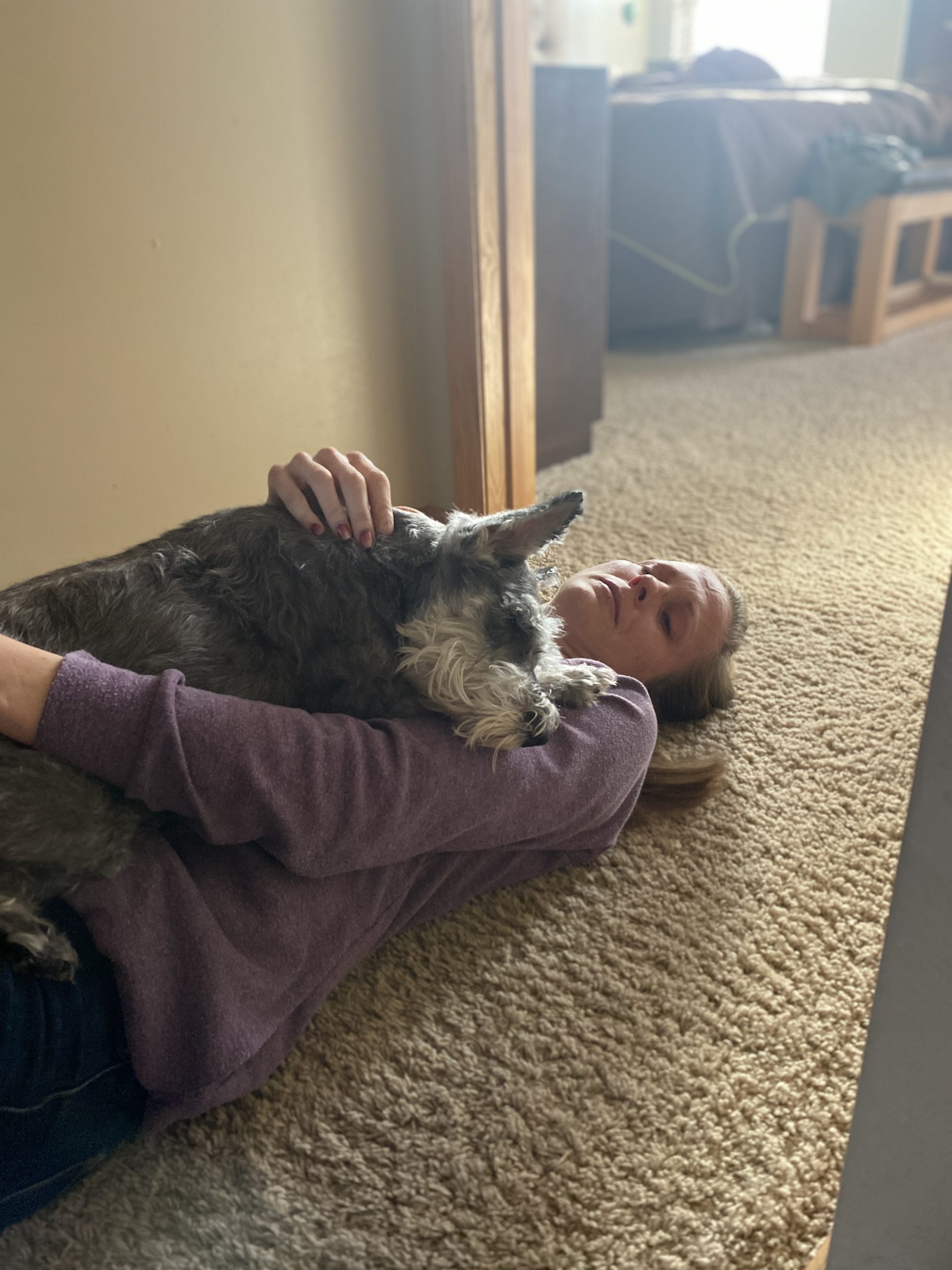
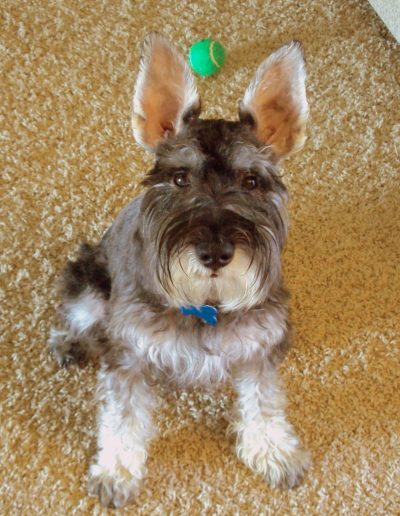
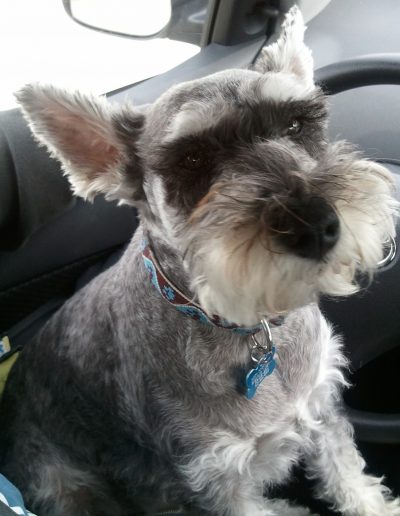
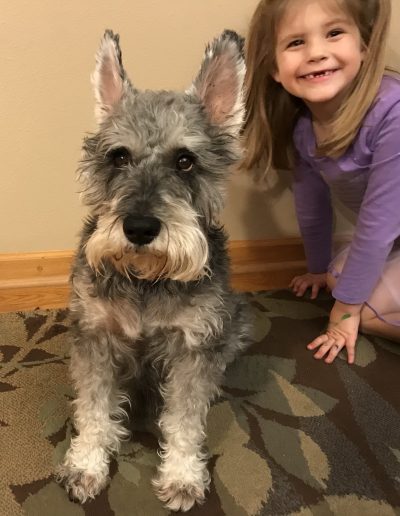
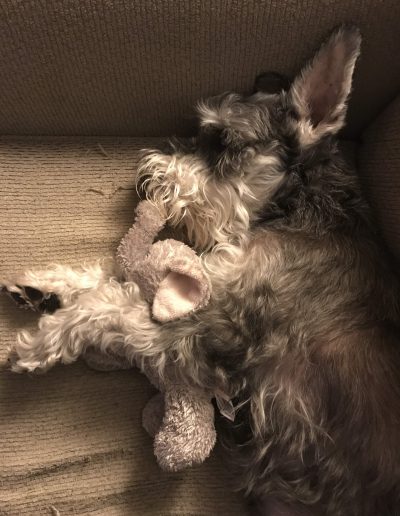
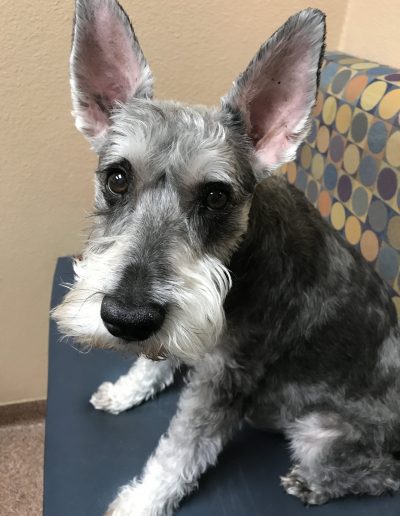
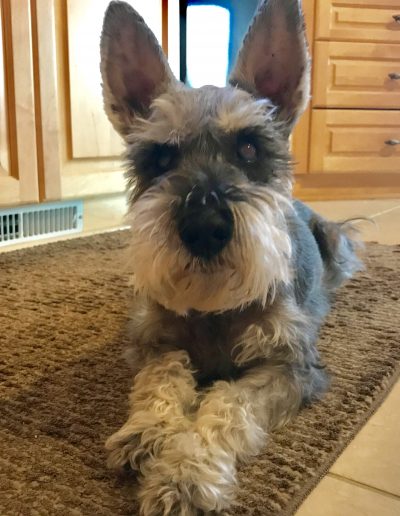
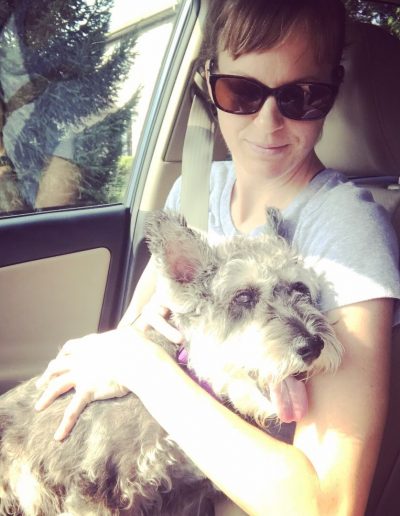
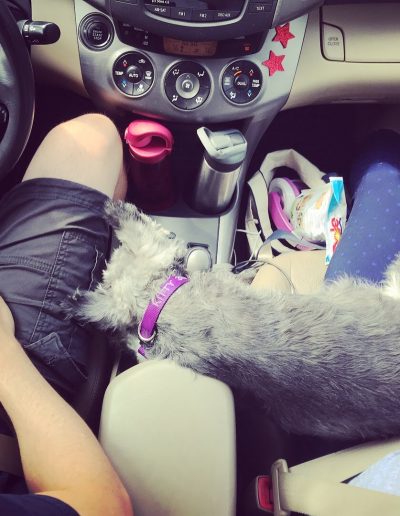
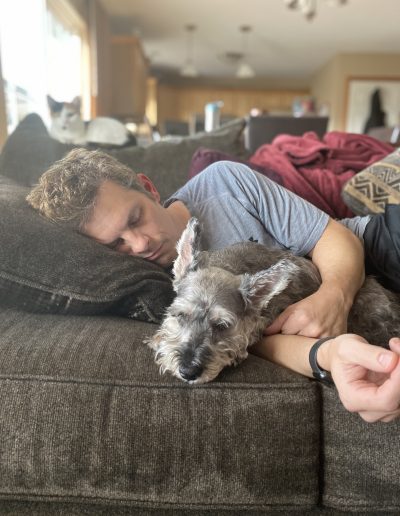
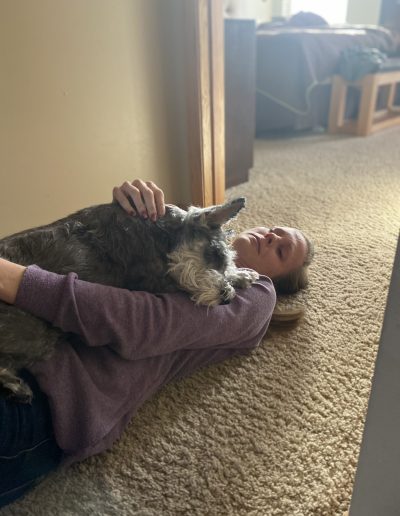
0 Comments